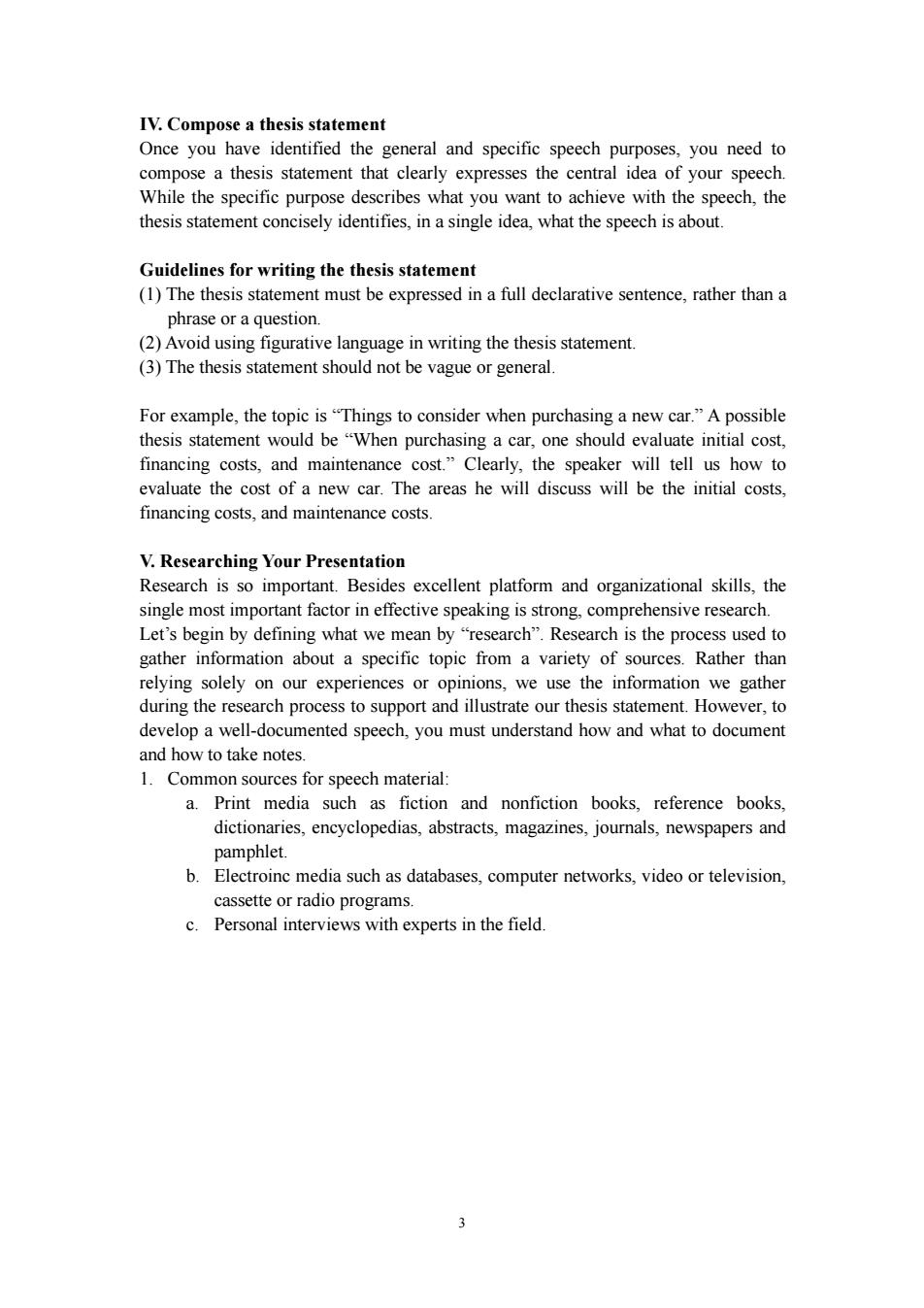正在加载图片...

IV.Compose a thesis statement Once you have identified the general and specific speech purposes,you need to compose a thesis statement that clearly expresses the central idea of your speech. While the specific purpose describes what you want to achieve with the speech,the thesis statement concisely identifies,in a single idea,what the speech is about. Guidelines for writing the thesis statement (1)The thesis statement must be expressed in a full declarative sentence,rather than a phrase or a question. (2)Avoid using figurative language in writing the thesis statement. (3)The thesis statement should not be vague or general. For example,the topic is "Things to consider when purchasing a new car."A possible thesis statement would be "When purchasing a car,one should evaluate initial cost, financing costs,and maintenance cost."Clearly,the speaker will tell us how to evaluate the cost of a new car.The areas he will discuss will be the initial costs, financing costs,and maintenance costs. V.Researching Your Presentation Research is so important.Besides excellent platform and organizational skills,the single most important factor in effective speaking is strong,comprehensive research. Let's begin by defining what we mean by "research".Research is the process used to gather information about a specific topic from a variety of sources.Rather than relying solely on our experiences or opinions,we use the information we gather during the research process to support and illustrate our thesis statement.However,to develop a well-documented speech,you must understand how and what to document and how to take notes. 1.Common sources for speech material: a.Print media such as fiction and nonfiction books,reference books, dictionaries,encyclopedias,abstracts,magazines,journals,newspapers and pamphlet. b.Electroinc media such as databases,computer networks,video or television, cassette or radio programs. c.Personal interviews with experts in the field.3 IV. Compose a thesis statement Once you have identified the general and specific speech purposes, you need to compose a thesis statement that clearly expresses the central idea of your speech. While the specific purpose describes what you want to achieve with the speech, the thesis statement concisely identifies, in a single idea, what the speech is about. Guidelines for writing the thesis statement (1) The thesis statement must be expressed in a full declarative sentence, rather than a phrase or a question. (2) Avoid using figurative language in writing the thesis statement. (3) The thesis statement should not be vague or general. For example, the topic is “Things to consider when purchasing a new car.” A possible thesis statement would be “When purchasing a car, one should evaluate initial cost, financing costs, and maintenance cost.” Clearly, the speaker will tell us how to evaluate the cost of a new car. The areas he will discuss will be the initial costs, financing costs, and maintenance costs. V. Researching Your Presentation Research is so important. Besides excellent platform and organizational skills, the single most important factor in effective speaking is strong, comprehensive research. Let’s begin by defining what we mean by “research”. Research is the process used to gather information about a specific topic from a variety of sources. Rather than relying solely on our experiences or opinions, we use the information we gather during the research process to support and illustrate our thesis statement. However, to develop a well-documented speech, you must understand how and what to document and how to take notes. 1. Common sources for speech material: a. Print media such as fiction and nonfiction books, reference books, dictionaries, encyclopedias, abstracts, magazines, journals, newspapers and pamphlet. b. Electroinc media such as databases, computer networks, video or television, cassette or radio programs. c. Personal interviews with experts in the field